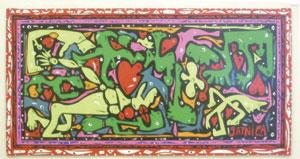Like many, my understanding of schizophrenia used to be a hazy mélange of dual personalities and that old Ingmar Berman film Through a Glass Darkly — you know, a sort of Jekyll/Hyde characterization that ends in tragedy but never really explains the complexity of this oft-misunderstood mental illness. It’s never been the sort of thing people really like talking about, because admitting to this stuff has historically meant a one-way ticket to ostracism and a white padded cell.
But now we know more. We know that schizophrenia can be controlled with medication, understanding and support. Sadly, society still tends to be somewhat repelled by any instability related to the mind, and it’s not easy to put a sympathetic face on an illness that robs its victims of the ability to interact appropriately with others.
“So many people think it’s just about some crazy shopping-cart lady screaming at everybody on the street,” says Michael Cobb, a board member of Toronto’s Secret Handshake peer support group for schizophrenics. “But if people would take the time to find out more, they’d know that schizophrenics are just trying to live out their lives like everyone else.”
Cobb notes that many schizophrenics remain undetectable to the general public if provided with suitable care and appropriate medications — a truth that hit surprisingly close to home a few years ago.
“I was part of the general ignorance, too, until my partner told me he was schizophrenic,” Cobb says. “It can be challenging at times, but he’s 100 percent well right now. All it takes is empathy and understanding.”
The group sponsors a variety of programs for its members, as well as public events that reach out into the general community. The Secret Handshake Gallery is one of those attempts to foster social engagement, a space where artwork from both members and non-members is displayed. Members are encouraged to take part in art workshops organized by the committee, and the gallery gives them the opportunity to showcase their work.
One of the gallery’s most popular events is its monthly Mutual Readings series, hosted by performance artist, painter and poet David Bateman.
“It’s open to members and non-members alike,” Bateman says. “It’s usually poetry, but presenters also show their work, or something else performance-related. Last time we had a clown performance. It’s very diverse.”
Bateman became involved with the gallery through a friend, poet and mental health advocate Bill Bissett. While the gallery is devoted to schizophrenia-related issues, supporters like Bateman often come in to share work that sometimes has a difficult time finding its place in mainstream spaces.
“The gallery totally embraces queer culture,” says Bateman, whose eclectic, queer-centric paintings have also graced the space’s walls. “It’s such a comforting, welcoming space where everyone is welcome and encouraged to take part.”

 Why you can trust Xtra
Why you can trust Xtra


